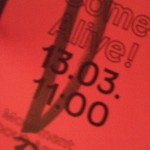Went to Casco's Come Alive symposium today, subtitle: no movement without archives. It was not…
Keeping your question alive
Did the first of a series of 3 Supportive Studies yesterday, lecture by Arjen Mulder. As always, a pleasure to listen to him. Topic was ‘how to get started on a research essay’. Will put some stuff here that I want to remember.
Why write an essay? To start a debate, to formulate one’s thoughts in such a way as to be able to talk about them with others. Essays are not about solutions/answers. If the research question is better put at the end than at the beginning, the essay is a success. Keep the question alive, don’t push a solution.
Essay is not to be about opininons (‘I hate plastic surgery’) or feelings (‘that’s just how I feel about plastic surgery’) or taste (‘I think plastic surgery is ugly’).
You don’t know how big your research field is at the beginning, and you may never find out entirely. Find books & articles, do interviews, use google. And still it will happen that you chance upon material at a late stage. This cannot be avoided. If you don’t start writing until you have surveyed your whole field, you may never get started.
To start the essay, it is a good idea to summarise one’s books and articles and have a few quotes handy.
Structure of the essay: see below.
We spent a lot of time on good first lines. These should be constructed with a view of making the reader curious enough to want to read the whole thing. Arjen read us a few first lines from last year’s students essays. I just dread the thought of him doing this to mine next year – the man has a mind like a razorblade. Which I admire. And also find daunting. Anyway, things that work for first lines: decontextualisation, quotes, jumping right in, cliche-turned-around. Less effective: self-reflection, criticism, quotes that are so good the essay won’t live up to them.
Possible structure of the essay v 1.0:
Research question
Context/field description
Summary 1 plus quotes
Summary 2 plus quotes
Summary 3 plus quotes
etc
Conclusion
Visual project
Structure of a literature survey essay v 2.0:
Research question
Context/field description plus
visual project description
Summaries plus own words,
concepts, argument
Results of visual project
Conclusion (‘this is what we know about this topic at this moment’)
Structure of a scientific essay v 2.0
Question and context
Method and techniques
Results of experiments
Discussion
Conclusion (‘more research has to be done’)
Structure of an “I- the art student’ type essay
Question and context
Description of the research path, step by step
Conclusion (“this is how I, young hero, have travelled”)
Arjen also mentioned the ‘free essay’ – be as crazy as you like. But have very good narrative style, or it will fall flat.
[much later: I cheated – my essay has the form of an online game – the structure is a 4 x 4 memory game, and each couple of cards a player finds gives him/her access to a snippet of text]
| « Swing – but respectably | <-- previous post | next post --> | Lights out for the Domkerk proposal » |
|---|







